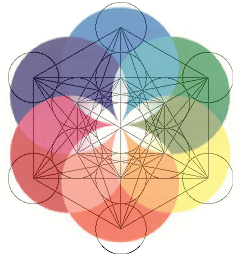Comparative Numerology: The Numbers One to Ten: Fundamental Powers |
| |
| # |
Suares |
Iamblichus |
Schimmel |
Schneider |
Brown |
Popular |
Fourth Way |
Consensus |
Christian |
| 1 |
Life/Death |
Unity Identity |
Primordial Being |
Wholly One |
Form |
Initiating |
Unity |
Unity Creation |
Unity Oneness |
| 2 |
Container |
Formless Form |
Polarity Division |
Two to Tango |
Content |
Cooperation |
Duality |
Duality |
Dividing |
| 3 |
Movement |
Actuality Extension |
Synthesis |
Three-part Harmony |
Agreement |
Expression |
Relationship |
Power |
Divine Perfection |
| 4 |
Resistance |
Solidity |
Material Order |
Mother Substance |
Distinction |
Foundation |
Material Existence |
Solidity |
World Creation |
| 5 |
Life |
Life Mediacy |
Life/Love |
Regeneration |
Identity |
Expansion |
Growth |
Sensuality |
Grace |
| 6 |
Sex/Union |
Perfection |
Created World |
Structure Function |
Value |
Nurturing |
Movement |
Perfection |
Carnal man |
| 7 |
Indeterminate Probability |
CriticalTime Chance |
Wisdom |
Enchanting Virgin |
Consequence |
Understanding |
Attainment |
Mysticism |
Spiritual Perfection |
| 8 |
Sum of
Possibilities |
Harmonic Sum |
Auspicious |
Periodic Renewal |
Invariance |
Practical |
|
Justice |
New Birth |
| 9 |
Cell/Structure |
Limit End |
Magnified Three |
Horizon |
Variance |
Humanitarian |
|
Achievement |
Finality |
| 10 |
Existence |
Perfection Wholeness |
Completion |
Beyond Number |
|
|
|
|
God's Law |
| |
| Carlo Suares, Cipher of Genesis, Red Wheel/Weiser; ISBN: 0877287406; (March 1992) |
| The Theology of Arithmetic: Iamblichus Robin Waterfield (Translator), Keith Critchlow, Phanes, 1988
|
| The Mystery of Numbers Oxford, Annemarie Schimmel, Franz Carl Mysterium Der Zahl Endres 1994
|
|
Michael S. Schneider, A Beginner's Guide to Constructing the Universe, Harper Perennial; ISBN: 0060926716; 1995
|
| G. Spencer-Brown: Laws of Form Cognizer Co; ISBN: 0963989901; Reprint edition 1994 |
|
|
| Comparative Semantics of the Hebrew Alefbet
|
Hebrew Numbers 1-10 / One to Ten |
Fundamental Powers: Hebrew Numbers with Gematria |
Gematria |
Gematria of Gematria
|
The Egyptians and Pythagorean Greeks found qualities in numbers, or rather gods, which were responsible
for the construction of the universe. The instrumentality of creation, the decad, is represented
by the Tetractys,
"the source and root of eternal nature." See
Lambdoma.
Iamblichus points out that nine is an absolute limit on numerical identity; all numbers
following are composites of the first nine, which are fulfilled/perfected in the tenth.
This is why nine is seen as the end of a cycle in almost all
numerological systems. The Qabala knows this cycle as the first nine letters of the Hebrew alphabet,
understood as the minimal set of archeyptal structural (formative/semantic) energies required for biological life
on an abstract level; and that the "achievement" of Tayt/9 is the formation of an (abstract) cell.
With the basic structural-energetic requirements met by the semantic primes of the first nine number-letters,
creation (which is behind this process) can be fulfulled in actual existence, which is exactly what happens in the
tenth letter-number, Yod/10, semantic prime for existence.
1 is fulfilled in 10, which is 1 in existence, and the power underlying all existence -- the "source and
root of eternal nature." 10 creates all things and is the kingdom or crown of God's creation.
All the attributed qualities are only natural-language shells for the inner, semantic-structural
energies, which may be sought in the hologram of the Hebrew alphabet
and in the gaps between related signifiers like movement, extension, synthesis, and resistance, solidity, material order.
Why do different sources pretty much agree on the general meanings of a non-existent or mythical property?
And interestingly, G. Spencer-Brown is pretty congruent for a more modern source.
The qualities chosen by Suares, though still sense-bound and arbitrary, are the most inclusive
because they are the most abstract and generalized. It is in this direction that we must look
for the actual properties, themselves completely generalized abstract formative energies by
definition.
|
|



